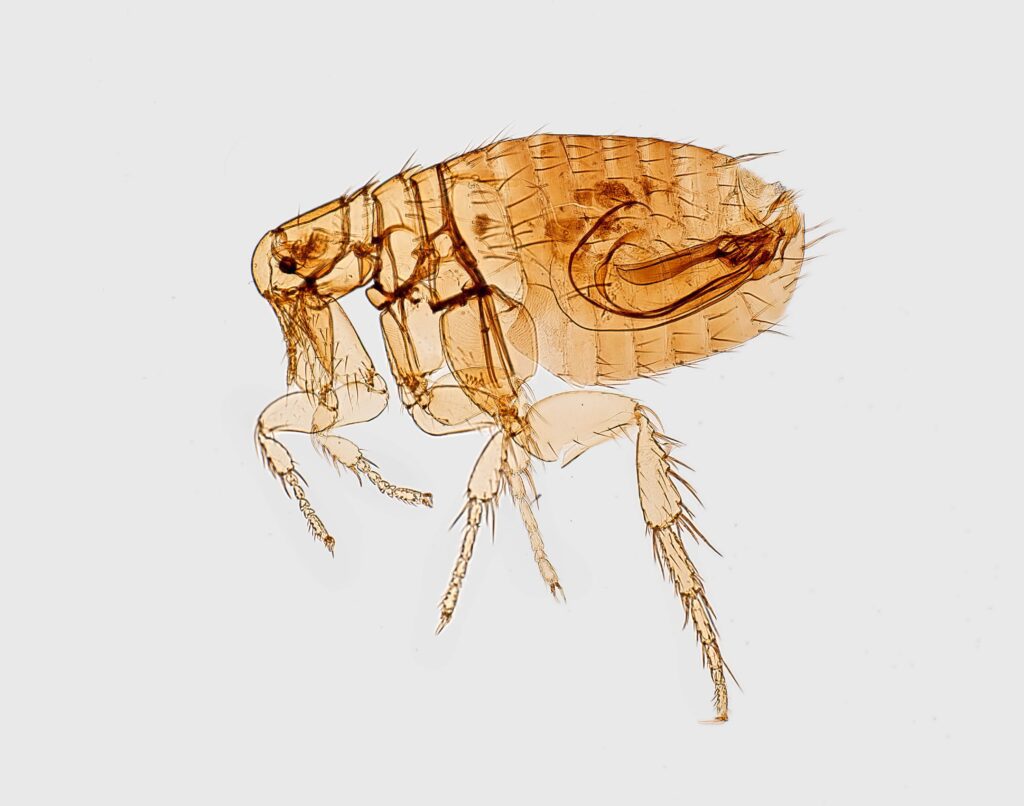Anyone with a cat or dog will know the signs. The poor creature cannot settle for more than a few minutes before it is scratching again. While you’re watching your restless pet, you find you’re scratching as well – and there are small raised red spots on your skin which itch and itch. There’s only one logical explanation – there’s fleas in your house. How are you going to explain this to your dinner guests next week?

Let’s clear up one point at the beginning; having fleas in your home is not an obvious sign of your home being dirty. Fleas don’t mind whether you spend several hours a day or a few minutes a week cleaning and washing – they care only that your home is warm. Although you can reduce your chances of having a full-scale flea infestation by keeping the house thoroughly cleaned and your pets flea-treated regularly, fleas are mobile. One flea catching a lift on your pet or your clothing from outside can settle into your nice warm home and breed.
There are three major flea species in the UK – cat fleas, dog fleas and human fleas in order of increasing rarity – but any of them are willing to take a tiny bite out of a cat, a dog, a rabbit or a human, so if you have those itchy red bitemarks on your feet and hands, you won’t be able to identify which species did the damage. Nor will you care, I suspect. You just want them out of your house.
Fleas have four stages in their life cycle. Stage one is the egg laid by the adult flea. This develops into the second stage – the larva. The larva sheds its skin up to three times as it grows, finally spinning a silken cocoon to protect it as it pupates. Within a week, the adult flea is fully grown within the cocoon. It can wait for up to a year or it can emerge immediately, depending on what’s outside. The adult flea in its cocoon can sense when the time is exactly right to break out – the right temperature and crucially, the presence of a good host passing within leaping distance.
The good news is that temperatures below freezing will kill adult fleas. The bad news is that eggs, larvae and pupae react to freezing cold by becoming dormant, waiting it out until the temperature rises enough for them to thrive. The really bad news is that a female flea can live for up to two years and lay up to 1,500 eggs in her lifetime.
If you do decide to tackle a flea infestation alone, read the instructions on the packaging of the insecticide carefully and follow them to the letter. As with all pest control measures, this is a form of poison you’ll be handling. It can cause serious illness to you or your pet if used incorrectly. It will take you at least two applications to eradicate all the fleas and all their juvenile stages, as only the adult fleas can be killed by insecticides; the pupa are protected in their cocoon and emerge two weeks later to hold another giant flea party in your house. You will have to repeat your flea treatment at the recommended interval to kill the new batch of hatching fleas, or they’ll be back.

A licensed pest control company can tackle a flea infestation for you, though again, please listen when they tell you what you have to do next. We apply a delayed-action insecticide to carpets to kill the next batch of adult fleas when they hatch, so please don’t hire a steam cleaner and attack the carpets with hot soapy water until it has had time to work.
Once you’re sure you’re rid of these biting pests, take steps to keep them out. Vacuuming the carpet all the way to the edges and under the furniture will be a good way of disturbing their lifecycle (but empty the vacuum after you’ve finished). Don’t forget to treat your pets regularly for fleas and tapeworm, whether you see signs of fleas or not. Fleas cause misery to pets, and not just from the scratching. Fleas can carry tapeworm eggs. A cat or dog grooming a flea from its fur and swallowing it may infect itself with tapeworms, so evict both of these monsters before they cause any real damage.
As with all pests, act as soon as you think you have a flea problem. Don’t let them get settled in!
Don’t be embarrassed about having fleas! Contact us, we know how to send them packing

